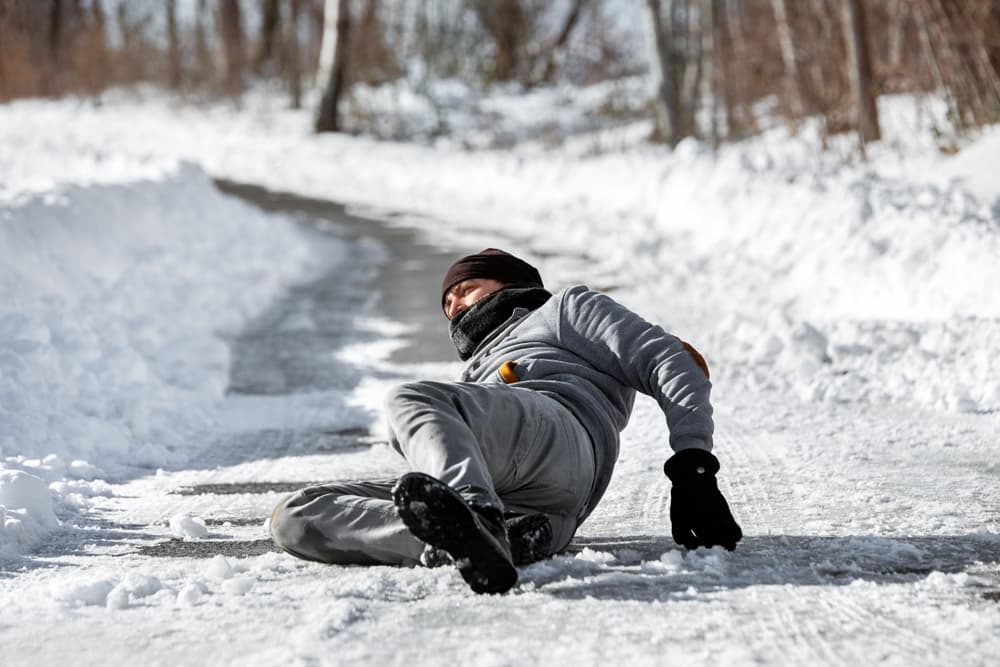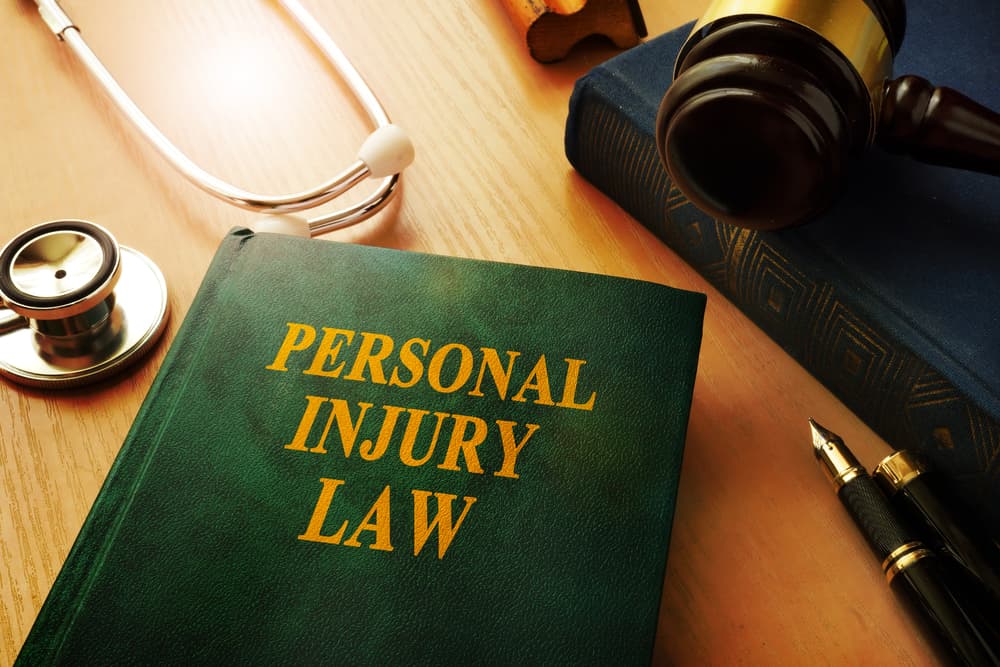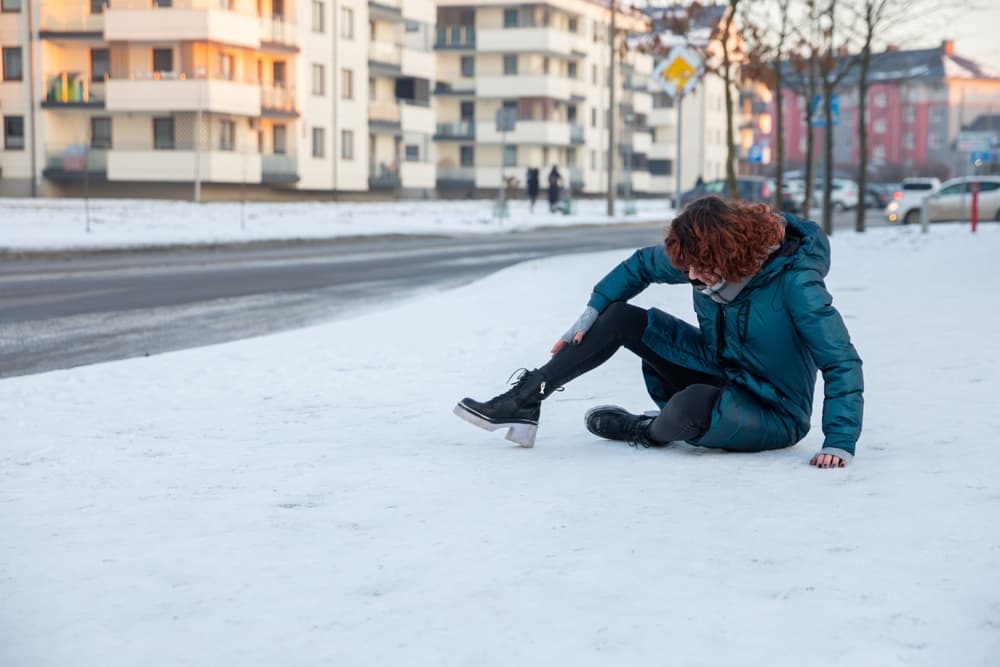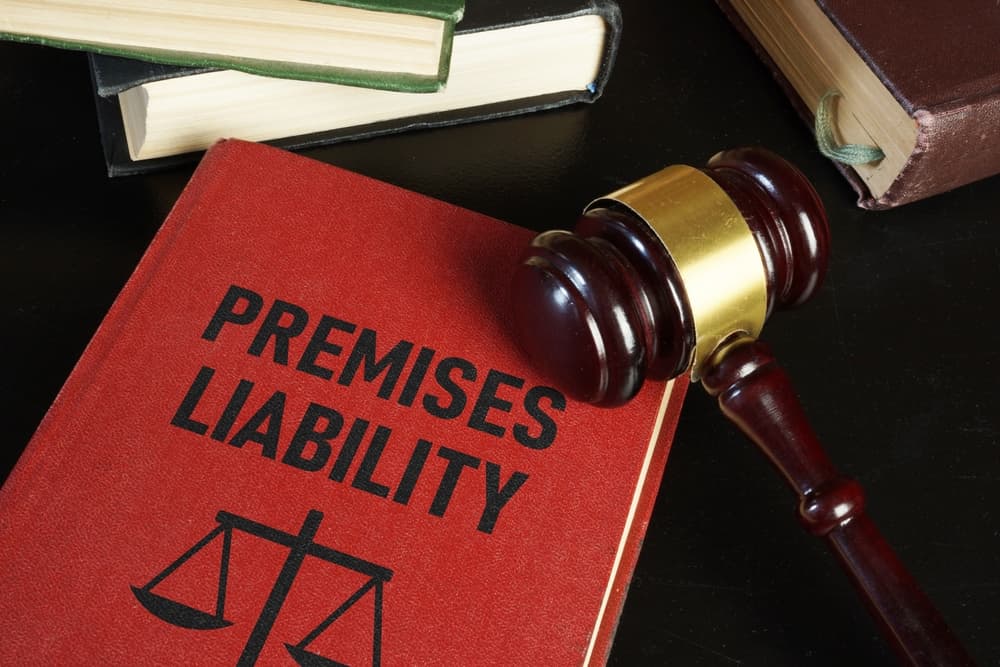- December 31, 2024

Have you slipped on an icy sidewalk or fallen on snow-covered steps? These winter-related accidents happen more often than you might think.
When someone gets hurt from slipping and falling on ice or snow, it's legally called a slip and fall or premises liability accident. Sometimes, these falls can cause serious injuries. If this happens to you or someone you know, you might wonder who is responsible. That's where a slip and fall accident lawyer can help.
A slip and fall accident attorney can help determine who is at fault when someone gets hurt on snow or ice-covered property. They can look at what happened and figure out if the property owner did something wrong. If the owner didn't take proper steps to remove snow and ice, they might have to pay your medical bills and other costs.
Let's explore how lawyers determine who is liable or responsible in winter-related slip and fall cases. We'll look at different situations where ice and snow falls can happen, what property owners should do to keep people safe in winter conditions, and how injured people can get help. By the end, you'll understand more about winter slip and fall accidents and why having a good lawyer matters.
Contact us online, and let us safeguard your rights and future.
Slip and Fall Accidents: What Are They?
A slip and fall in winter conditions is pretty much what it sounds like - when someone slips on ice or snow on someone else's property and gets hurt. It can happen in lots of different places:
- Icy parking lots
- Snow-covered sidewalks
- Frozen steps or entryways
- Untreated walkways during winter storms
These accidents can cause all sorts of injuries. Some might be minor, like bruises or scrapes. But others can be severe, like fractures or traumatic brain injuries. That's why knowing what to do is vital if it happens to you.
When someone gets hurt in a winter-related fall, they might need medical care. They can miss work and lose money. In bad cases, they might have long-lasting pain or disability. All of these things cost money, and that's where the question of liability comes in.
Understanding Personal Injury Law

Winter slip and fall cases fall under a part of the law called personal injury. This area of law deals with situations where one person (or company) causes harm to another person. The basic idea is that if someone's carelessness in maintaining their property during winter conditions hurts you, they should help pay for your recovery.
Personal injury law can be complicated, especially when it comes to winter weather incidents. There are rules about how to prove what happened and who's at fault. That's one reason why people often hire a slip and fall accident attorney. These lawyers know all about personal injury law and can guide you through the process.
One important concept in personal injury law is negligence. Negligence means someone didn't take reasonable care to prevent harm to others. In a winter slip and fall case, a property owner might be negligent if they knew about dangerous ice or snow conditions but didn't address them or warn people about them.
For example, if a store owner knows their parking lot is covered in ice but doesn't salt it or put up warning signs, that may be considered negligence. The owner might be liable if someone slips on that ice and gets hurt.
But it's not always simple to prove negligence in winter weather cases. That's where the rules of evidence come in. These are legal rules about what information can be used in court to prove what happened. A good slip and fall lawyer knows these rules well and can use them to build a strong case.
The Role of Property Owners
Whether they are a business, a homeowner, or a city government, property owners have a duty to maintain their property in a reasonably safe condition, even in challenging weather.
It doesn't mean they have to keep surfaces completely ice-free all the time. But they do need to take reasonable steps to remove snow and ice and prevent dangerous conditions. They should also warn people about hazards they know about but haven't addressed yet.
For businesses, this might mean:
- Regular snow removal and ice treatment in parking lots
- Salting or sanding walkways
- Clearing snow from entryways promptly
- Putting out warning signs during storms
For homeowners, it can include:
- Shoveling snow within a reasonable time after it falls
- Treating icy patches on walkways
- Maintaining proper drainage to prevent ice formation
- Warning guests about any known ice hazards
Cities and towns have similar responsibilities for public spaces like sidewalks and parking areas.
But remember, property owners aren't automatically responsible for every winter-related accident on their property. They're only liable if they were negligent—meaning they knew or should have known about the danger and didn't take reasonable steps to address it.
When is Someone Liable for a Slip and Fall on Ice and Snow?
So, how do we figure out if a property owner is liable for a winter-related slip and fall accident? There are a few key questions a slip and fall injury attorney will look at:
- Did the owner fail to remove snow and ice within a reasonable time?
- Did the owner know about dangerous ice conditions but not treat them?
- Should the owner have known about the ice hazard and fixed it?
- Did the injured person do something careless that contributed to their fall?
The answers to these questions help determine liability. If the property owner knew about ice but didn't treat it, they're more likely to be liable. However, if the injured person was careless, the owner's liability might be reduced.
It's also important to consider timing and weather conditions. If someone falls during an active snowstorm, the property owner might not be liable because they haven't had a reasonable chance to clear it. But if that ice has been there for days, that's a different story.
A slip and fall injury attorney can investigate these details and build a strong liability case.
Proving Your Case After a Slip and Fall on Ice and Snow

If you’ve suffered an injury in a slip and fall accident and think the property owner is liable, you must prove it. This is where things can get tricky and why you should work with an experienced personal injury lawyer.
To prove your case, you’ll need evidence. It might include:
- Photos of the accident scene
- Witness statements
- Accident reports
- Medical records showing your injuries
- Expert testimony about safety standards
Gathering this evidence can be challenging, especially when dealing with injuries. A lawyer can help collect and organize this information to build a strong case.
One important tool lawyers use is called discovery. This is a legal process where both sides of a case can ask for information from each other. Through discovery, your lawyer might get the property owner’s maintenance records, security camera footage, or other critical evidence.
The rules of civil procedure guide how this process works. These are the rules that govern how lawsuits are conducted. They cover things like how to file a lawsuit, how to request information from the other side, and how trials are run. A premises liability lawyer knows these rules inside and out and can use them to your advantage.
All of this evidence and legal know-how comes together to prove negligence. Remember, that’s the key to winning a slip and fall case. You must show that the property owner didn’t take reasonable care to prevent accidents.
Understanding Damages After a Slip and Fall Accident
You might be awarded damages if you win your slip and fall case. Damages are money paid to compensate you for your injuries and losses. There are different types of damages you might receive:
- Medical expenses: This covers the cost of your medical treatment, including hospital bills, doctor visits, physical therapy, and any future medical care you might need.
- Lost income: If you missed work because of your injuries, you can be compensated for the lost income. It can also include future lost earnings if your injuries affect your ability to work long-term.
- Pain and suffering: This is meant to compensate you for the physical pain and emotional distress caused by your injuries. Putting a dollar value on this is challenging but vital to many personal injury cases.
- Property damage: If your personal property was damaged in the fall (like a broken phone or watch), you can be compensated for that, too.
The damages you might receive depend on many factors, including how severe your injuries are, how they affect your life, and how clear the property owner’s liability is. A skilled accident lawyer can help present your case in a way that shows the full extent of your damages.
The Legal Process of a Slip and Fall Case
Here’s a general outline of the process if you decide to pursue a slip and fall case:
- Initial consultation: You meet with an injury lawyer to discuss your case. They’ll ask questions about what happened and evaluate whether you have a strong claim.
- Investigation: If the lawyer takes your case, they’ll gather evidence. It might include visiting the accident scene, talking to witnesses, and reviewing your medical records.
- Demand letter: Your lawyer will write to the property owner or insurance company explaining your claim and asking for compensation.
- Filing a lawsuit: If the other side doesn’t agree to a fair settlement, your lawyer might file a lawsuit on your behalf.
- Discovery: Both sides exchange information about the case. It can include written questions, document requests, and depositions (formal interviews under oath).
- Negotiation: Throughout this process, your lawyer will negotiate with the other side to reach a fair settlement.
- Mediation or arbitration: Sometimes, both sides agree to use a neutral third party to help resolve the case. It can be faster and less expensive than going to trial.
- Trial: The case goes to trial if a settlement can’t be reached. A judge or jury will hear the evidence and decide who is liable and what damages should be awarded.
Many slip and fall cases are settled before they go to trial, but a good lawyer prepares every case as if it were going to trial. This thorough preparation often leads to better settlement offers.
Working with a Slip and Fall Premises Liability Lawyer

You might be wondering how you can afford to hire a lawyer if you’re already dealing with medical bills and lost income. The good news is that many slip and fall accident lawyers work on a contingency fee basis.
It means the lawyer only gets paid if you win your case. Their fee is a percentage of the damages you receive. If you don’t win, you don’t owe the lawyer anything for their time. This arrangement allows people to get legal help even if they can’t afford to pay a lawyer upfront.
When looking for the best fall accident lawyer, you need to find someone with experience in these types of cases. They should know the ins and outs of premises liability law and have a track record of successful settlements and trials.
During your initial consultation, feel free to ask questions. A good lawyer will be happy to explain things clearly and help you understand your options. They should give you a realistic idea of what to expect from your case, including potential challenges and likely outcomes.
Your lawyer is your advocate. They’re there to fight for your rights and help you get your deserved compensation. But they also need your help. Be honest with your lawyer about all the details of your accident and your injuries. Follow their advice about medical treatment and what to say (or not) to insurance companies.
Talk to a Slip and Fall Accident Attorney to Understand Your Options
Slip and fall accidents can happen to anyone, anywhere. When they do, it’s essential to know your rights and options. If you’ve suffered an injury in a fall on someone else’s property, you might be entitled to compensation for your medical bills, lost income, and other damages.
Determining liability in these cases can be complicated. That’s why many people choose to work with a dedicated personal injury lawyer. These lawyers have the knowledge and experience to investigate your accident, gather evidence, and build a strong case. They can guide you through the legal process and fight for fair compensation on your behalf.
If you’ve suffered an injury in a slip and fall accident, it’s worth talking to a lawyer at Goodman Acker P.C. to understand your options. Contact us today for a free consultation.
Contact us online, and let us safeguard your rights and future.

